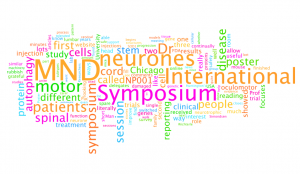Each year we proudly organise the International Symposium on ALS/MND, and this year was a record breaker! The symposium was held in Chicago where over 900 clinicians, scientists and healthcare professionals attended the three-day event. With 86 international speakers and over 300 posters we managed to write about it all in just over 5,000 words in our daily articles on this blog.

Here’s a brief guide about what we wrote about along with links for the full articles:
Nature, nurture genetics and / or chance – what causes MND? Trying to understand what the different underlying factors are towards developing MND has always been a goal for ALS research. MND Association funded researcher and clinician Professor Ammar Al-Chalabi from King’s College London, gave a talk on this topic at the opening session.
Recognising and supporting the role of informal carers The symposium session ‘Carer and Family Support’ provided a platform to better understand the role that informal carers play in the lives of people with MND and discussed ways that we can improve support to carers.
A prize-wining story worth repeating Many congratulations to Rosa Rademakers from Mayo Clinic Florida USA, winner of this year’s Paulo Gontijo Young Investigator award. She won the award for her work on co-discovering the gene defect in C9orf72.
Mastering Pac-man Brian explains rubbish and recycling in relation to neurones after Prof Anne Simondsen’s talk where she described the ways in which neurones deal with their cellular rubbish.
The clinical trials session An update on the Np001 clinical trial, as well as the results from the NeuralStem safety trial.
Reflections on the poster session The two sessions felt quite different (‘a game of two halves’ is the phrase that comes into my head). At the first, there were lots of people there and lots of discussion. At the second, it was quieter, and more in depth, earnest conversations went on.
Vive la difference It could be easy to assume that one motor neurone is pretty much like another, but a series of presentations on Thursday clearly showed that we need to be a little more sophisticated in our thinking.
Reading the stars – why are ‘astrocytes’ toxic? A session uncovering the clues behind these support cells, and finding out as to why they are toxic to motor neurones.
Storify From the very beginning to the very end. From publishing the abstract book online to photos of presenters and their posters. See the story of the symposium unfold with our storify.
The 24th International Symposium on ALS/MND will be held in Milan, Italy in December 2013.
After you’ve finished reading the symposium articles that interest you, we’d be grateful if you could spare a few minutes to fill in our short online survey on our symposium reporting. Your comments really are useful and allow us to continually improve our symposium reporting. surveymonkey.com/s/alssymp


Comments are closed.